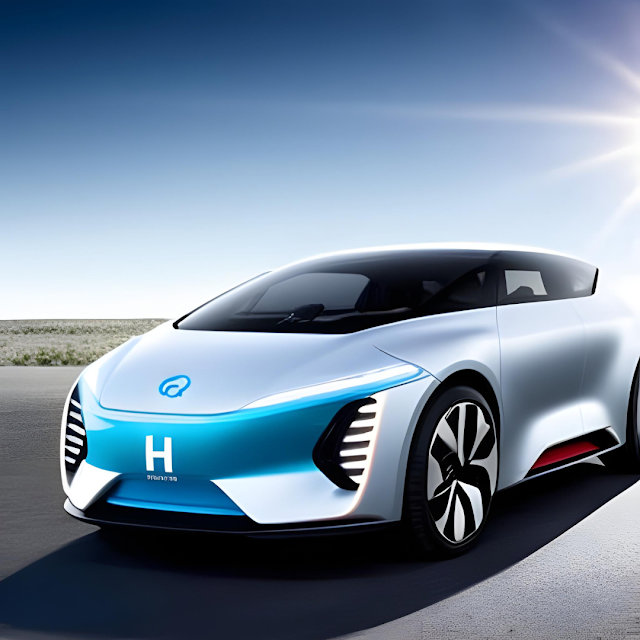Hydrogen: The Fuel of the Future
Hydrogen is the most abundant element in the universe, making up about 75% of its elemental mass. It is found in water, organic matter, and fossil fuels. Hydrogen is a clean-burning fuel that produces only water when it is burned. This makes it an attractive alternative to fossil fuels, which produce harmful emissions when they are burned.
Hydrogen has been used as a fuel for many years. It is used in fuel cells to produce electricity, in the production of ammonia for fertilizers, and in the refining of crude oil. However, the use of hydrogen as a fuel has been limited due to the high cost of producing and storing it.
The production of hydrogen can be done through several methods. The most common method is steam methane reforming, where natural gas is reacted with steam to produce hydrogen and carbon dioxide. Another method is electrolysis, where water is split into hydrogen and oxygen using electricity. Both methods require energy input, which can come from renewable sources such as solar or wind power.
One of the biggest challenges facing the use of hydrogen as a fuel is its storage. Hydrogen has a low density and must be compressed or liquefied to be stored. This requires expensive equipment and can result in safety concerns. However, research is being done to develop new methods of storage, such as using metal hydrides or carbon nanotubes.
Despite these challenges, there are many benefits to using hydrogen as a fuel. One of the biggest benefits is its environmental impact. Hydrogen produces no greenhouse gas emissions when it is burned, making it a clean-burning fuel. This can help reduce air pollution and combat climate change.
Another benefit of hydrogen is its versatility. It can be used in a variety of applications, from powering vehicles to heating homes. Hydrogen fuel cell vehicles have been developed by companies such as Toyota and Honda. These vehicles use fuel cells to convert hydrogen into electricity, which powers an electric motor. They have a longer range than traditional electric vehicles and can be refueled in minutes, making them more practical for long-distance travel.
Hydrogen can also be used to power homes and businesses. Fuel cells can be installed in buildings to generate electricity and heat. This can reduce reliance on the electrical grid and provide a more reliable source of power.
The use of hydrogen as a fuel has the potential to create new industries and jobs. It can help spur the development of new technologies and infrastructure. This can lead to economic growth and increased energy security.
However, there are still challenges that must be overcome before hydrogen can become a widely used fuel. One of the biggest challenges is the cost of production. The current methods of producing hydrogen are expensive and require a lot of energy. This makes it difficult to compete with fossil fuels, which are cheaper and more widely available.
Another challenge is the lack of infrastructure for storing and transporting hydrogen. There are currently only a few hydrogen refueling stations in the world, making it difficult for hydrogen fuel cell vehicles to be used on a large scale. More infrastructure will need to be developed to support the widespread use of hydrogen as a fuel.
Despite these challenges, the future looks bright for hydrogen as a fuel. Research is being done to develop new methods of production and storage, and governments around the world are investing in the development of hydrogen infrastructure. The use of hydrogen as a fuel has the potential to transform the energy landscape and create a cleaner, more sustainable future.
Hydrogen and Fuel Cells: Clean Energy Seminar
Introduction to Hydrogen and Fuel Cells Seminar
There are many seminars on hydrogen and fuel cells conducted by different organisations and government bodies. In these seminars discussions conducted on, the game-changing technologies shaping the clean energy revolution and cover the basics, applications, challenges, and potential of these innovative solutions.
List of Organisations who conduct Hydrogen and Fuel Cells Seminar
Here are five organisations known for conducting Hydrogen and Fuel Cells seminars, along with their names and websites:
1. International Association for Hydrogen Energy (IAHE)
- Website: [https://www.iahe.org/](https://www.iahe.org/)
2. American Hydrogen Association (AHA)
- Website: [https://www.americanhydrogenassociation.org/](https://www.americanhydrogenassociation.org/)
3. Fuel Cell and Hydrogen Energy Association (FCHEA)
- Website: [https://www.fchea.org/](https://www.fchea.org/)
4. European Hydrogen Association (EHA)
- Website: [https://www.h2europe.eu/](https://www.h2europe.eu/)
5. International Conference on Hydrogen Production (ICH2P)
- Website: [https://www.ich2p.com/](https://www.ich2p.com/)
Along with international bodies, there is a Indian organisation too, whose details is given below.
6. Indian Hydrogen Association (IHA)
-Website: (https://indianhydrogenassociation.com/)
The Indian Hydrogen Association is actively involved in promoting hydrogen and fuel cell technologies in India and often organizes seminars, conferences, and workshops to facilitate discussions and knowledge sharing in this field. You can visit their website for information on upcoming events and activities related to hydrogen and fuel cells in India.
Please note that the availability of seminars and events may vary, so it's a good idea to check their respective websites for the most up-to-date information on upcoming seminars and conferences related to hydrogen and fuel cells.
Below are the some topics on which discussions are conducted in seminar hall-
Hydrogen Essentials
Discover the fundamentals of hydrogen: its properties, sources, and eco-friendly production methods. Explore how hydrogen can replace fossil fuels and reduce emissions.
Fuel Cell Technology
Uncover the magic of fuel cells-devices that convert hydrogen into electricity efficiently and with minimal pollution. Learn about their diverse applications, from cars to power generation.
Real-World Impact
See how hydrogen and fuel cells are transforming industries like transportation and energy. Explore practical case studies demonstrating their value today.
Overcoming Challenges
Recognize the hurdles in hydrogen's path, from production to cost. Stay informed about ongoing research and innovation driving solutions.
Environment and Economics
Understand the environmental footprint of hydrogen production and its economic feasibility. Learn about policies and incentives supporting hydrogen's growth.
Future Possibilities
Look ahead to the role hydrogen will play in our sustainable energy future. Discuss its potential to reshape industries and daily life.
One can join the seminar to gain unique insights into the clean energy revolution driven by hydrogen and fuel cells and become part of the solution to our planet's energy challenges.
Before visiting hydrogen fuel seminar, learn something about it. Some topics that to be discussed are described below-
Green Hydrogen: A Clean Energy Game Changer
Green hydrogen, often considered as the future of clean energy, as hydrogen gas produced through a sustainable and eco-friendly process. Unlike conventional hydrogen production methods that rely on fossil fuels, green hydrogen is generated by electrolyzing water using renewable energy sources like wind or solar power.
This process of generation of H2 from H2O, releases no greenhouse gases, making green hydrogen a critical element in decarbonizing industries such as transportation, energy storage, and heavy manufacturing. Its versatility, zero-emission nature, and potential to store renewable energy make green hydrogen a key player in our transition to a sustainable, low-carbon energy future.
Blue Hydrogen: A Low-Emission Energy Source
Blue hydrogen is a type of hydrogen produced from natural gas, a fossil fuel. However, what sets it apart is its commitment to reducing carbon emissions. During the production process, carbon dioxide (CO2) is captured and stored, preventing it from being released into the atmosphere.
This carbon capture and storage (CCS) technology makes blue hydrogen a lower-emission alternative compared to conventional grey hydrogen, which does not incorporate CCS. While not entirely emissions-free, blue hydrogen represents a transitional step toward cleaner hydrogen production, supporting efforts to address climate change while maintaining a hydrogen-based energy economy.
Hydrogen Power Generator: Clean and Efficient Energy
A hydrogen power generator is an innovative device that uses hydrogen gas to produce electricity through a process known as electrolysis. In this system, hydrogen gas is introduced to one side of the generator, while oxygen is supplied to the other. These gases react electrochemically to generate electrical energy and release water vapor as the only byproduct, making it an eco-friendly and the sustainable power source.
Hydrogen power generators are highly efficient, have a wide range of applications, and are particularly valuable in situations where clean, reliable energy is essential, such as in remote areas or as a backup power source. Their ability to produce electricity without emissions or pollution makes them a promising solution in our pursuit of cleaner and more sustainable energy alternatives.
Fuel Cells: Clean Power from Hydrogen
Fuel cells are energy conversion devices that generate electricity through an electrochemical process using hydrogen as a fuel. They offer a highly efficient and environmentally friendly way to produce electricity, emitting only water and heat as byproducts.
Fuel cells have a wide range of applications, from powering electric vehicles to providing backup power for buildings and remote locations. Their versatility and minimal emissions make them a promising technology in the quest for sustainable and clean energy solutions.
What is the difference between Hydrogen Fuelcell and Hydrogen Power Generator
The primary difference between hydrogen fuel cells and hydrogen power generators lies in their application and operational principles. Fuel cells are more efficient and are commonly used in mobile applications, while hydrogen power generators are typically stationary and rely on combustion processes to produce electricity. Both technologies utilize hydrogen as a clean fuel source, contributing to reduced emissions and a more sustainable energy future.
Advantages and Disadvantages of Hydrogen as a Fuel
There are many advantages and disadvantages of hydrogen as a fuel, some of them are explained below.
Advantages of Hydrogen as a Fuel:
- Zero Emissions: One of the most significant advantages of hydrogen as a fuel is that it produces zero greenhouse gas emissions when used in fuel cells, making it a clean energy source that can help combat climate change.
- High Energy Density: Hydrogen has a high energy-to-weight ratio, which means it can store a large amount of energy in a relatively small volume, making it an efficient fuel for various applications.
- Versatility: Hydrogen can be used in a wide range of applications, from fueling vehicles (hydrogen fuel cells) to providing electricity for stationary power generation and heating.
- Rapid Refueling: Refueling hydrogen-powered vehicles is comparable in speed to refueling gasoline or diesel vehicles, making it a practical option for transportation.
- Reduced Dependence on Fossil Fuels: Hydrogen can be produced from various sources, including renewable energy (green hydrogen) and natural gas with carbon capture and storage (blue hydrogen), reducing our reliance on fossil fuels.
Disadvantages of Hydrogen as a Fuel:
- Production Challenges: The most significant challenge is the energy-intensive process of hydrogen production. Most hydrogen is currently produced from fossil fuels, which can offset its environmental benefits.
- Storage and Transportation: Hydrogen has low energy density by volume, requiring large storage tanks or high-pressure containers, which can be costly and challenging to transport.
- Safety Concerns: Hydrogen is highly flammable and can be challenging to handle safely. Although safety measures are in place, accidents can still occur.
- Infrastructure Development: Building a hydrogen infrastructure, including production, storage, and distribution facilities, is a significant undertaking that requires substantial investment.
- Energy Losses: Converting energy to hydrogen and then back to electricity in fuel cells can result in energy losses, making the overall efficiency lower compared to some other energy storage and conversion technologies.
- Resource Availability: The production of hydrogen from renewable sources is dependent on the availability of these resources (e.g., wind, solar) and may face intermittent supply challenges.
In conclusion, hydrogen offers the potential to be a clean and versatile energy carrier but faces significant challenges related to production, storage, transportation, safety, and infrastructure development. Ongoing research and innovation are essential to harness its full potential as a sustainable energy solution.




%20(1).png)
